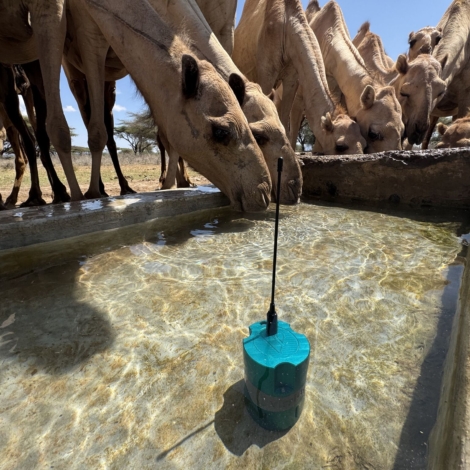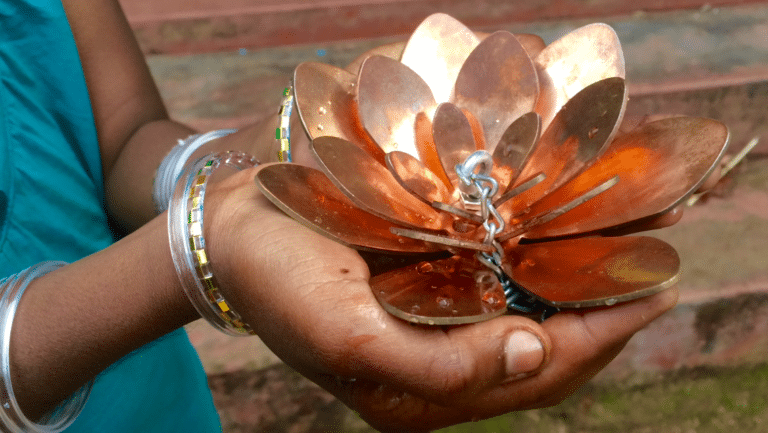Read More | The People’s Choice: Promising Prototypes to Watch This Year
Each year, Engineering for Change compiles a list of prototypes to watch in the sector of technology for sustainable development. These technologies are recommended by our global network of engineering and design experts. This year we combed through technologies in design competitions and awardees of ASME ISHOW, recommendations from the heads of our Impact Projects program and recommendations made to our Solutions Library and through our social media. One rule: The design must be in development, or it must have recently undergone an upgrade. These are promising prototypes to watch in 2025.
M2X Modular Gas-to-Liquids plants
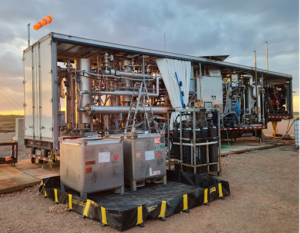
Photo: M2X Energy [published with permission]
M2X is producing a modular plant and Engineering for Change’s Impact Projects program supported the development. In 2023, the startup field-tested their first commercial-scale, trailer-based methanol production unit. They have since scaled up production in a new manufacturing facility.
M2X Energy’s Website: m2x.energy
Read more: These Modular Gas-to-Liquids Plants Could End Gas Flares
Laero’s Cyclau water reuse system
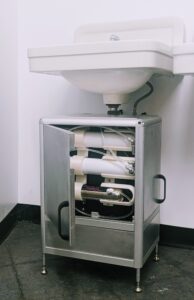
Photo courtesy of Cycleau
Cycleau is a compact graywater treatment system that can be installed as a retrofit. It works under sinks and in showers and laundry to convert the used graywater into drinking water. It removes more than 200 contaminants through a four-stage cleaning process. This device can cut water use by 80% and save 40% of water heater energy, according to the startup.
“The solution improves water reusage while also conserving the heat from heated water,” Leah Putman at Engineering for Change says. “The multiple benefits of circularity while improving water health make this an interesting medium term solution.”
Laero’s website: laero.org/cycleau
Uravu Lab’s Air-to-Water System

Photo: Andy Feliciotti / Unsplash
Uravu Labs Pvt Ltd is developing air-to-water technology that strips moisture from the air to produce drinking water. The startup is working with an Engineering for Change Impact Projects team to support their development of a 2,000 liter-per-day system.
The device absorbs moisture from the air using liquid salts, then heats the salts to release water. The technology promotes sustainable water sourcing that increases access to safe water and advances the UN Sustainable Development Goal 6 (Clean Water and Sanitation).
E4C is supporting comprehensive structural design of Uravu’s system and 3D modeling for precise visualization and assembly of the components.The collaboration will employ simulation software to analyze airflow and fluid flow dynamics within the device, focusing on maximizing condensation rates and optimizing heat transfer to enhance energy efficiency.
Uravu Labs Pvt Ltd Website: uravulabs.com
Afya Lead’s Mkanda Salama for treating postpartum hemorrhage

Image courtesy of ASME ISHOW
Sub-Saharan Africa has one of the highest rates of maternal mortality in the world at 542 deaths per 100,000 live births, compared to 216 per 100,000 worldwide. The leading cause of death is postpartum hemorrhage. The startup Afya Lead in Dar es Salam, Tanzania, is developing a solution they call Mkanda Salama, a patented, non-invasive, affordable device designed to reduce postpartum hemorrhage. The device is an affordable, user-friendly belt that applies gentle pressure to the uterus. It requires no specialized training for use, making it ideal for resource-limited settings.
Afya Leads has established partnerships with major research institutions, including the National Institute of Medical Research and the Ifakara Health Institute. After completing their first minimum viable product, the startup is positioned for further field testing as they make progress in the healthcare sector.
Mkanda Salama is an awardee of ASME ISHOW Africa 2024.
Afya Leads Website: www.afyalead.co.tz
Novocycle’s direct recycling process for EV batteries
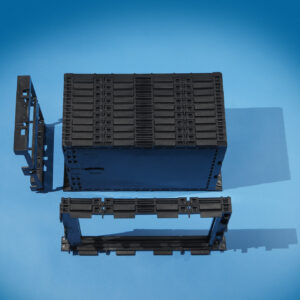
EV battery. Photo: spe.automotive (CC BY 2.0)
A surge of depleted electric vehicle batteries is expected to hit recycling plants within a decade as the batteries in today’s EV’s hit their end of life. Recyclers meanwhile are building capacity and searching for better recycling methods. Traditionally, smelting batteries in a furnace has been the most common method of recycling lithium-ion batteries, but the technique can recover only 40-60% of the material.
As an alternative, the Turkish startup Novocycle is developing a direct recycling process that has achieved more than 90% recovery. Their secret is to carefully dismantle the materials in the batteries through an automated process, then they chemically separate materials through a hydrometallurgical phase.
The biggest challenge, says co-founder Fatih Bosna, is sorting batteries, but new tools such as AI and machine learning are improving accuracy.
Novocycle’s Website: novocycle.com
Learn more: Innovators in EV Battery Recycling Are Challenging Incumbent Technology
Mega Gas biogas for community kitchens

Image courtesy of ASME ISHOW
The startup Mega Gas Alternative Energy Enterprise Ltd in Nairobi, Kenya, is developing a process for converting plastic waste into clean cooking biogas. Through their patented process, the venture converts and distributes biogas to their network of women entrepreneurs. Their community kitchens offer affordable, eco-friendly cooking solutions at (USD) $0.02 per hour, serving as social hubs for low-income households.
Mega gas has recently expanded with the launch of a new kitchen in Soweto. Supported by (USD) $50,000 in new funding, the startup has also upgraded infrastructure and machinery in their production facility, enhancing efficiency and capacity.
Mega Gas is an awardee of ASME ISHOW Africa 2024.
Mega Gas Website: www.megagasalternativeenergy.co.ke
Virridy’s Lume fecal sensor for water
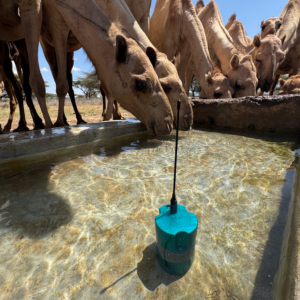
Photo courtesy of Virridy
Lume, by the startup Virridy, is a fully autonomous, Internet-connected sensor that detects E. coli in water. The presence of the bacterium implies fecal contamination of the water, and the device can provide early warning. Virridy spun out of the University of Colorado Boulder and is supported by the US National Science Foundation and Blues wireless.
Virridy’s team installed the sensors on chlorinated pumping systems in northern Kenya and in Rwanda.
There is competition in the E. coli sensor market, but Lume differentiates itself. These devices are built for long-term, continuous remote use; they adapt to conditions over time through a machine learning model, reducing the need for maintenance and cleaning; and they are inexpensive, using low-cost components such as LEDs and silicon photomultipliers, the Lume team told E4C by email.
Lume has undergone testing in Boulder Creek near the University of Colorado Boulder campus, and recently it has been tested in Rwanda and Kenya.
“Currently, we have installed the Lume in the distribution system of a borehole serving chlorinated drinking water to a community in Isiolo, Kenya. Two sensors have also been installed in Lifestraw filters that provide clean drinking water to school children in Rwanda,” Whitney Knopp at Virridy told E4C.
Virridy is seeking beta testers for Lume and has begun field trials in communities in Kenya.
Virridy’s Website: virridy.com
Learn more at Virridy Lume Tests Drinking Water for E. coli
Periwinkle Lab’s Ikshana urinary incontinence treatment

Image courtesy of ASME ISHOW
Periwinkle’s non-invasive wearable device, Ikshana, treats urinary incontinence in women. The startup spun out of the Indian Institute of Science in Bangalore, India, and is developing technologies to address pelvic floor health, including Ikshana. This wearable provides adaptive stimulation, discreetly integrated into shorts.
Periwinkle Labs recently secured a patent for Ikshana. The startup is a graduate of ASME IDEA Lab, where they refined their design to reduce costs and minimize waste. These improvements in affordability and accessibility improve their chances to deliver real impact in the health sector, Adam Horbinski at ISHOW and IDEA Lab says.
Periwinkle Labs is an awardee of ASME ISHOW India 2024.
Periwinkle Labs Website: periwinkle-labs.com
Airvitalize’s filterless outdoor air purification
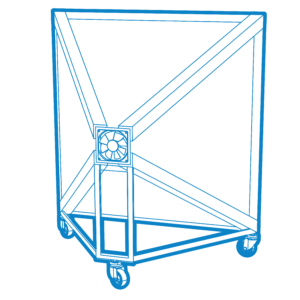
Image courtesy of ASME ISHOW
Airvitalize is developing an outdoor air purification system that is filterless and easy to maintain. The Vita 1.0 captures particles in outdoor air and emits cleaner air for outdoor gatherings. The startup is targetting sporting events and public spaces such as parks as potential use cases, touting the benefits of cleaner air and a healthier environment.
Airvitalize have opened a pre-seed funding round and secured their first investor.
The startup is an awardee of ASME ISHOW North America 2024.
Airvitalize’s Website: www.airvitalize.tech
Promising Prototypes Watch
Startups developing technologies that made our Promising Prototypes lists in years past have been working to scale toward commercialization. This is an update on a few prototypes we’ve been watching.
ChemFinity’s selective membranes and adsorbents
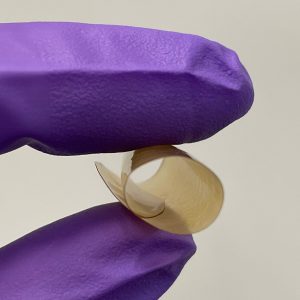
Photo courtesy of Adam Uliana / Chemfinity
ChemFinity Technologies, Inc. made our list of Promising Prototypes to Watch in 2023 with their highly selective membranes and adsorbent “nano sponges.” Their technology filters pollutants and recovers valuable resources. Spun out of UC Berkeley in 2022, the Brooklyn-based company has secured four U.S. Small Business Innovation Grants in the past year, including a January grant to support purifying mine drainage.
The team is testing prototypes for environmental justice applications, such as recovering critical metals from e-waste and catalytic converters, water desalination, and using a porous polymer sorbent to address pollution in the Amazon’s gold mining industry.
Balloon Tech’s High-Altitude Wildfire Detection
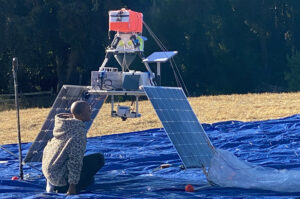
Photo courtesy of Beth Van Eman / Good Machine
Balloon Tech, Co., a portfolio startup with Good Machine venture studio, was a Promising Prototype to Watch in 2024. The company has been working with Engineering for Change’s fellows to develop their high-altitude platform for wildfire detection. Although wildfires are their first application in development, the platform is actually multi-purpose, capable of carrying a payload for many different kinds of Earth observations.
With Balloon Tech’s permission, we can now disclose a little more about the design. The platform is a suite of optical and infrared cameras and solar panels lifted by a balloon inflated with helium. It’s a locally deployable solution providing Earth observation data on demand. The platform can be customized for different purposes, and its first application will be to support wildfire fighters, tracking fires and mapping their boundaries.
Good Machine’s Website: goodmachine.studio
